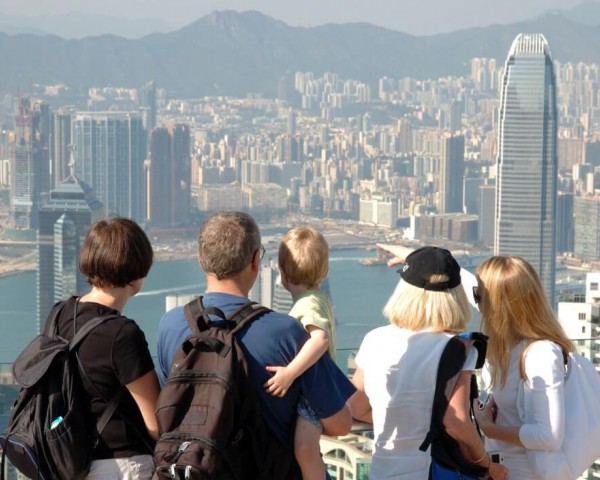Since Hong Kong fully reopened to travelers in February last year, after three years of strict pandemic rules, mainland Chinese visitors have primarily returned to the city. According to Hong Kong Tourism Board data, the number of mainland tourists in the last quarter of 2023 had recovered to around 80% of the average in the five years between 2015 and 2019.
However, long-haul tourists have seen a slower recovery, with just about 60% of the average number of visitors from 2015 to 2019. Visitors from South and Southeast Asia recorded the fastest growth, while numbers from Europe and the United States lagged behind.
During the fourth quarter of 2023, Hong Kong saw a significant decrease in long-haul tourists visiting from the UK and the US. Compared to the same period in 2018, the city welcomed only 72,035 UK tourists and 216,965 US visitors instead of 158,702 and 377,613, respectively. Experts have attributed this decrease to long-haul tourists not returning to Hong Kong as quickly as before, mainly due to the airlines not having restored the number of flights to the city to pre-pandemic levels.
During the COVID-19 pandemic, Cathay Pacific faced concerns about overheads. To manage the situation, the management decided to let go of half of the pilots. As a result, the Hong Kong-based carrier’s workforce decreased as the strict COVID-19 rules grounded planes and halted flight routes. In 2019, Cathay Pacific employed nearly 4,000 pilots, but now it has around 2,500 pilots, according to the Hong Kong Aircrew Officers Association.
Before the pandemic, Cathay Pacific flew to 119 destinations, as stated in its 2019 annual report. However, as of the end of 2023, the airline had only around 80 places on its route map. The decrease in flight availability led to higher airfares to Hong Kong. For instance, a UK family of four would have to pay HK$50,000 to HK$60,000 (US$6,380–7,656) for a round-trip to Hong Kong.
However, it is essential to note that the blame can only partially be placed on Cathay Pacific alone, as long-haul flights to Hong Kong across airlines have generally not fully recovered. Hong Kong’s tourism industry must have more flights and expensive airfares.
The reduction in the number of flights arriving in Hong Kong has negatively impacted the city’s status as an aviation hub. In 2019, Hong Kong International Airport was ranked 10th on the list of the world’s airport mega hubs based on the destinations served by the airport and scheduled seat capacity. However, last year, the airport’s ranking dropped to 37th place. Other Asian cities, such as Kuala Lumpur, Bangkok, and Jakarta, have surpassed Hong Kong in the ranking.
Experts suggest that the protests in 2019 and the COVID-19 pandemic have made airlines hesitant to project Hong Kong as a viable travel destination. Business travelers are a significant customer base for flights to Hong Kong, but with fewer major conventions and events, the city has seen a decline in interest.
Hong Kong authorities have set the goal of regaining the trust of tourists. The government announced that it had allocated HK$1.1 billion to promote “mega-events,” organize monthly pyrotechnics and drone shows, and collaborate with influencers to promote Hong Kong.
The government’s publicity efforts aim to present Hong Kong as a lively and attractive destination for travel and business.
However, tourists who visit Hong Kong today find it a city that has undergone significant changes. Following large-scale protests in 2019, Beijing imposed a national security law on Hong Kong in 2020, which has led to the disbandment of civil society groups and the imprisonment of many activists.
The city of Hong Kong has recently enforced a colonial-era sedition law, leading to the arrest of several people, including ordinary citizens, over allegations of endangering national security. The US, Canadian, and Australian governments, among other Western nations, have issued travel warnings for Hong Kong, citing “broad” and “arbitrary” local laws.
In March, after the passage of additional security legislation, the Australian government updated its advisory to highlight the new national security offenses. The advisory warns that individuals could be detained without charge for up to 16 days and denied access to legal assistance for up to 48 hours.












